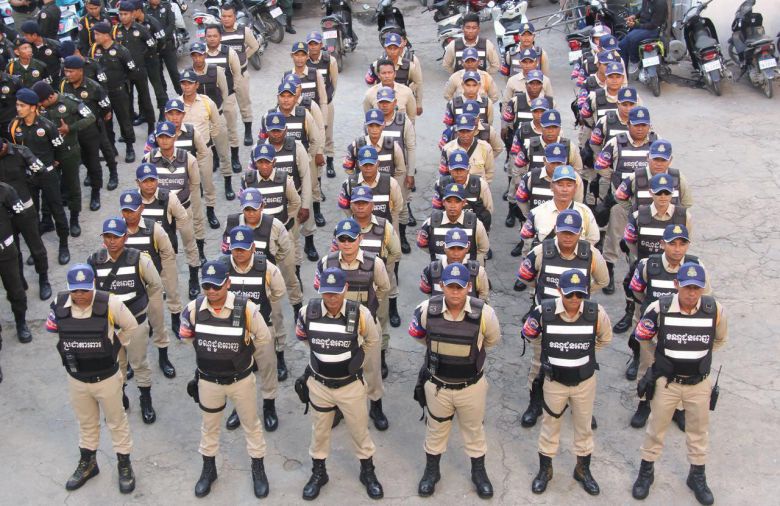Checkpoints went up on national roads, barricades were dumped in front of the Supreme Court and police paid unannounced visits to civil society organisations and opposition officials as darkness fell yesterday ahead of today’s Supreme Court hearing on the dissolution of the opposition CNRP.
The security measures coincided with reports of a sharp uptick in harassment and surveillance of Cambodia National Rescue Party officials in the provinces, party members said yesterday.
Drivers yesterday reported multiple checkpoints along national roads 31 and 3 in Kampot province, National Road 48 in Koh Kong and National Road 8 in Tbong Khmum province, while rights group Licadho said its officers had noted heightened police presences in Pursat, Svay Rieng and Kampong Cham provinces.
Security forces consisting of a mixture of local police, Military Police and district security guards also appear to have paid coordinated visits to several prominent NGOs last night to check whether the groups were housing would-be demonstrators ahead of today’s highly controversial hearing.
Naly Pilorge, director of advocacy at Licadho, said roughly 40 police and Military Police officers came to their offices around 6pm.
In a message, Pilorge said the sharp increase in security measures “shows paranoia”.
“Instead of police officers serving and protecting citizens, they are asked to stop and check citizens and at times harass citizens who just want to drive or move from place to place,” Pilorge said, referring to restrictions placed on citizens entering the capital ahead of the hearing.
Sar Mory, deputy president of the Cambodian Youth Network, said roughly 30 security personnel also paid a visit to its offices at Solidarity House yesterday evening.
“They said nothing, but they wanted to know the number of people staying in the office,” Mory said at about 8:30pm. “It’s a kind of threat, and they are still there now.”
Employees of election monitoring watchdog Comfrel and rights group Adhoc said they were also visited by police and asked to fill out forms about how many people stayed at their office at night.
“Maybe they worry about tomorrow, that people from my office would come to protest at the Supreme Court,” said Adhoc’s Soeng Sen Karuna, who said police stayed for about 15 minutes and then gave him a copy of their report.
National Police spokesman Kirt Chantharith could not be reached yesterday.
The right to nonviolent protest is enshrined in both the Cambodian Constitution, as well as the Law on Peaceful Demonstrations. However, the Ministry of Interior has declared that any protests at the Supreme Court will be blocked, though CNRP leaders have maintained they are not calling for demonstrations.
Still, in a speech to mixed security forces yesterday afternoon, Daun Penh District Governor Sok Peng Vuth said he expected gatherings.

“We have to be wholeheartedly loyal to the government, to absolutely protect the government, to protect the hearing of the Supreme Court until the final court decision is announced,” Peng Vuth told the gathering. “Even if the hearing continues until 11pm or midnight, we have to maintain security to make sure the verdict on CNRP’s dissolution is successfully finished.”
As assistants handed out cash and food to the security personnel, the district governor also reminded the 200-strong crowd of district security guards, police and Military Police to be “firm, but gentle”.
However, “in necessary cases, we have the right to defend ourselves”, he added. “This is normal that we have to defend ourselves. We have the right to secure the places we are in.”
In Pailin, Battambang and Prey Veng provinces, CNRP officials reported organised efforts from police to get them to sign contracts promising not to travel to Phnom Penh for the hearing.
Kin Lueng, CNRP executive chief in Prey Veng province, said CNRP officials have been approached by police to thumbprint the contracts, and said one was even blocked from leaving his home by police.
“The reason was to force him to call the district chief executive . . . to come and thumbprint promising not to bring people to Phnom Penh tomorrow,” Lueng said.
In Battambang, CNRP executive chief Chea Chiv said an increased number of police and soldiers were patrolling the town looking for vehicles transporting people to the capital.
“We don’t have any plans to go to Phnom Penh, so none of our members thumbprinted promising not to come to Phnom Penh,” Chiv said. “But prominent activists and counsellors are being surveilled whether we go to Phnom Penh or not.”
In Kampot, where residents reported increased police activity, police chief Mao Chanmaturith said he deployed extra police merely to “educate” people to “make them understand whether going to do protest is legal or illegal”.
“On the streets, we just put checkpoints to check the traffic as normal,” Chanmaturith said.
But Cambodian Center for Human Rights Advocacy Director Duch Piseth said the increase in security was likely to breed confusion and intimidation among the public.
“Tightened security should be during conflicts, but I don’t see that the current people’s situation needs more security,” Piseth said. “It doesn’t need to be at that level.”
CNRP officials “are not suspects”, he added. “They represent the voice of the Cambodian people. I think they deserve more security and protection from the government rather than threats.”
Author: Niem Chheng, Daphne Chen and Leonie Kijewski
Source: Phnom Penh Post
